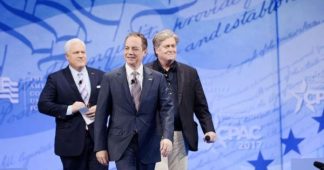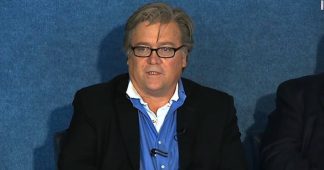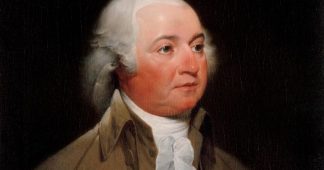By Mark Silk
August 11, 2019
Last spring, Steve Bannon opined to reporters that the just-completed Mueller investigation had gotten in the way of a national imperative to combat the “existential threat” of China.
“Eventually we’ve got to unite the Judeo-Christian West and Russia is part of that, and now that’s going to take many, many, many decades,” said President Trump’s sometime chief political strategist.
To the extent that Trump possesses a strategic vision of the world, Bannon is its theorist. And as such, he is responsible for the fourth iteration of Judeo-Christian ideology in American politics.
Let’s review the sequence.
In the 1930s, when anti-Semitism was on the rise on both sides of the Atlantic, Judeo-Christian language began to be used by interfaith organizations such as the National Conference of Christians and Jews to indicate a common religious cause. It served to signal opposition to America First anti-Semites, who were giving their organizations such names as the Christian American Crusade, the Christian Aryan Syndicate and the Christian Mobilizers.
During World War II, “Judeo-Christian” became more common, standing for liberal democratic values against fascism.
After the war, the term gained widespread popularity, as pastors, politicians and pundits seized on it to mobilize the spiritual forces of America against “godless” communism. As Daniel A. Poling, then president of the Military Chaplains Association of the United States, asserted at the association’s 1951 convention, “We meet at a time when the Judeo-Christian faith is challenged as never before in all the years since Abraham left Ur of the Chaldees.”
Over the next couple of decades “Judeo-Christian” began to pall, seeming to some like an empty cliché, to others the emblem of a civilization losing its way in the jungles of Southeast Asia, and to still others as insufficiently inclusive for a society that was becoming more and more religiously diverse.
Its most recent revival was due to the Christian right, which burst onto the American scene at the end of the 1970s. In his best-selling 1980 manifesto, “Listen, America!,” Jerry Falwell Sr. praised the refusal of the state of Alabama to participate “in any conference that did not establish traditional Judeo-Christian values concerning the family.”
Now the enemy was secular humanism, embodied in such causes as feminism, gay rights and stricter separation of church and state, and symbolized above all by the issue of abortion.
That Judeo-Christian cause remains alive and well, and Trump’s speechwriters know how to generate applause with it, as when the president told the Values Voter Summit in 2017, “We are stopping cold the attacks on Judeo-Christian values.” He proceeded to launch an attack on people who do not say “Merry Christmas.”
But Bannon’s use of “Judeo-Christian” is different. To understand it the place to begin is a talk he Skyped to a meeting of the conservative Catholic Human Dignity Institute held at the Vatican in the summer of 2014:
So I think the discussion of, should we put a cap on wealth creation and distribution? It’s something that should be at the heart of every Christian that is a capitalist. “What is the purpose of whatever I’m doing with this wealth? What is the purpose of what I’m doing with the ability that God has given us, that divine providence has given us to actually be a creator of jobs and a creator of wealth?”
I think it really behooves all of us to really take a hard look and make sure that we are reinvesting that back into positive things. But also to make sure that we understand that we’re at the very beginning stages of a global conflict, and if we do not bind together as partners with others in other countries that this conflict is only going to metastasize.
There’s no evidence here of support for either government regulation of wealth or the kind of private charity customarily advocated by religious conservatives. The “positive things” capitalists should be “reinvesting” in, we know from Bannon’s other work, is investment in economic activity at home.
Such enlightened capitalism — investment presumably undertaken voluntarily against pure bottom-line calculation — he believes to be the result of Judeo-Christian values that have been under assault in the West for several decades.
Not that we, America, can go it alone. National “partners” are needed to defend “the Judeo-Christian West.” The latter is threatened from the inside by globalist elites and migrants, and from the outside by “Islamic fascism” and, most importantly, Chinese-dominated East Asia.
Taken down to its essentials, the Bannon ideology is a brew of economic nationalism and anti-immigrant populism, wrapped in a simplified version of the late Samuel Huntington’s “clash of civilizations.”
Shortly after leaving the White House, Bannon told The Economist, “I want the world to look back in 100 years and say, their mercantilist, Confucian system lost. The Judeo-Christian liberal West won.”
Since then, he has been stumping around Europe to advance the right-wing agenda, complete with an Academy for the Judeo-Christian West to provide training in nationalist populist politics.
So how much has Bannon influenced his former boss? It is hard not to see Trump’s embrace of Russia, his support for right-wing populists in Europe and Latin America, and his expanding trade war with China in other than Bannonist terms. Earlier this month, Trump called Bannon “one of my best pupils” — a species of Freudian denial that shows he knows very well who the pupil really is.
The irony, of course, is that the leader who revived “America First” should be sailing under the Judeo-Christian flag first used to combat the original America Firsters eight decades ago
Published at https://religionnews.com/2019/08/11/our-latest-judeo-christian-civilizational-clash/
 The United Barbarian Front (Saudis, Israelis and US…
The United Barbarian Front (Saudis, Israelis and US… Clash of Civilizations 2.0 Sponsored by Prince and Bannon
Clash of Civilizations 2.0 Sponsored by Prince and Bannon Bannon: Economic War with China is Better than…
Bannon: Economic War with China is Better than… This Is How Steve Bannon Sees The Entire World
This Is How Steve Bannon Sees The Entire World 200 years before Trump, another Christian Zionist…
200 years before Trump, another Christian Zionist… Stop Nestlé executive’s appointment to the Swiss…
Stop Nestlé executive’s appointment to the Swiss…





